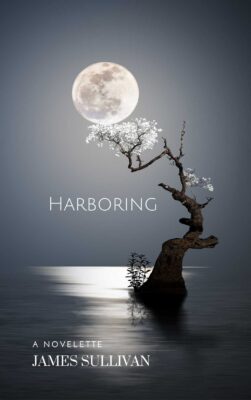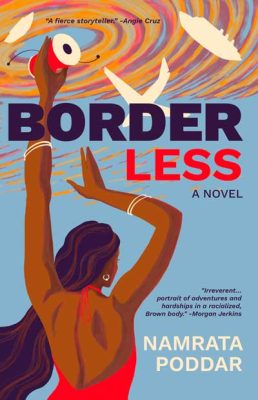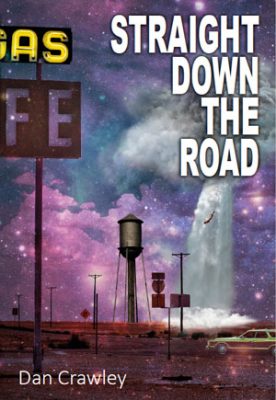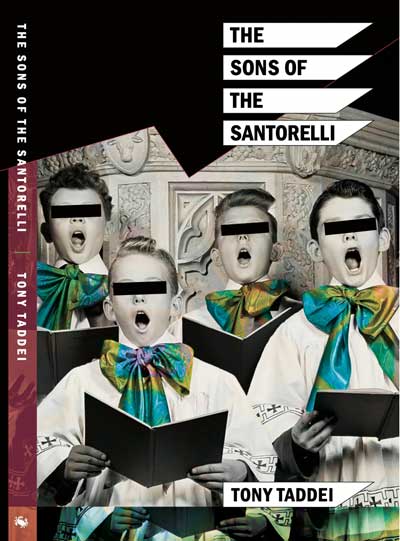
MAKING EACH STORY ITS OWN
a Craft Conversation with Tony Taddei
author of THE SONS OF THE SANTORELLI
speaking with fiction editor Andrea Caswell
Tony Taddei’s debut story collection, The Sons of the Santorelli, is a fast read: the prose is smart and snappy, the characters are funny and flawed, and we can’t look away from the situations Taddei has put them in, situations he believes “best evoke their mortality and individual points of view.” I recently had the opportunity to speak with the author about his book and the craft of short fiction. The discussion included reflections on writing family sagas, the do’s and don’ts of assembling a linked story collection, finding just the right words, and how Taddei’s training as an actor has helped him as a fiction writer. Our conversation has been edited for clarity. —AC, May 2022
Andrea Caswell: Tell us about the title and the title story.
Tony Taddei: The title came to me after I’d finished a couple of stories about the “sons of the sons” – the second-generation boys of the Santorelli family. Those were the first stories I wrote, and I’d already decided on the surname “Santorelli,” which in Italian means “little saints.” I remember rolling around the words “the sons of the sons,” and at a certain point I scribbled down the “The Sons of the Santorelli” in a notebook. Reading it out loud, I liked the alliteration of it, and I also liked the way the words themselves captured the entire saga of multiple generations. Even use of the article the before Santorelli seemed to be a way to signify a whole clan rather than just a single man. Everything about it felt right to me.
It was quite some time after I came up with the title that I wrote the book’s title story, which I’d planned on being the collection’s origin story. By then, using the title “The Sons of the Santorelli” for both that story and the collection had become an easy choice.
You have to find a way to become receptive and very loose in your mind and body when you write. You need to open the pathways to let in those words and phrases that, when you look at them again, make you feel as if they came from somewhere outside yourself.
AC: The collection covers a span of 60 years or so, across the lives of three generations of the Santorelli family. How did you decide where their family saga would begin, and where it would end?
TT: I didn’t know the timespan the stories would cover when I started to work on them. I always knew there’d be a story for each of the first- and second-generation sons (eight in all). I also knew that I wanted an origin story and at least one story about the patriarch of the family, but I wasn’t sure if that would be a single one or multiple stories, and I wasn’t sure in what time period I’d set them. It was only after I’d written each of the above stories that I started to get the sense that the book would span at least 50-60 years – from the early 1930s to the late 1980s. After that, I started to play around with other stories that I thought needed to be added to round out the collection. For instance, I wrote “Commedia dell’Arte” because I sensed that the collection needed at least one story from Aida’s (the matriarch’s) point of view. I also finished drafts of four other stories that took the grandsons into their adulthood, as men in their 40s and 50s. Those stories would’ve taken the collection well up to the 2000s, but once I started to assemble the book, I felt the sensibilities of those stories were part of a different collection. I took those out of the running, and it remains to be seen if I’ll use them as the start of another collection someday.
The circumstances and driving aspects of a story can be a metaphor for the story’s protagonist as well.
AC: There’s a tremendous intimacy to these stories, in that we get to know each character well and see them at some of their most desperate moments. We meet the sons as children, and by the end, they’re adults with their own problems. Yet each story can stand on its own, without needing to rehash previous plot points. Can you share some of the challenges of creating a linked collection like this? Another way of putting it: how did you do that?!?
TT: Once I came up with the family tree, so to speak, and I knew whose point of view I wanted to tell a story from, I just wrote the most honest and surprising, stand-alone stories that I could, trusting that the stories would eventually link in ways I may not have even planned. Of course, as you write a linked collection, you do know each of your characters, and once you’ve written the first few stories, you can use small details from the previous stories in the story you’re currently working on to link them together. But it’s not something I would recommend a writer think too much about when they’re creating a linked collection. A lot of the work of linking stories takes care of itself automatically in the writing, as well as in the reader’s mind. Once the collection is finished, you can always go back and embroider more links to make the connections stronger. What’s most important is to make each story its own, knowing that if you understand how the characters are related, the links will come naturally.
AC: A successful short story creates a sense of immediacy, a sense that something momentous is happening to a character, and I loved that quality throughout the book. Each story is exceptionally focused: an evening walk home from work, one hour of a bachelor party gone wrong, the first time someone uses a snowblower. How did you decide on these singular moments to communicate larger truths about each character?
TT: Again, each of the characters in these stories has their own strengths and failings. Keeping these characters and their personalities in mind, I wanted to draw out the most acute aspects of who they were, and I waited until I found a circumstance to put them in that would best evoke their mortality and individual point of view. I also wanted the book’s stories to have a dark sense of humor as well as a bit of a slapstick quality—humor and slapstick being about surprises, and surprises being what I most wanted these stories to deliver.
I believe that the circumstances and driving aspects of a story can be a metaphor for the story’s protagonist as well. In writing these stories, I waited to find just the right match between character and circumstance. When I found it, a lot of the rest of the writing took care of itself.
AC: Building on the previous question, is the short story your favorite form? At any point in time, did you think you might try to write a novel about this family?
TT: Yes, I like writing short stories most of all. The time frame for writing a short story can give you a more immediate payoff (if by ‘immediate’ you think in terms of the couple of months it can take to write and polish a story, as opposed to the couple of years it can take to write a novel). I’m impatient and tend to lose focus if I work on one single thing for longer than a few months. Short stories allow me to make something good out of that failing of mine. Though I might have tried to write a novel about the Santorellis, writing about them in the short story form not only felt like the right way to do it, but I also think it best suited my talents.
I wanted to help the reader to feel what it might be like to be inside the heads of these characters as they experience the world in their own peculiar ways.
Contradicting the above just a bit, I should add that despite my love of short stories. I have managed to write one pretty good novel, as well as a novella that I’m fond of (if anyone out there would like to read them, feel free to get in touch with me). I’ve also recently finished the first three chapters of a longer work (I don’t want to jinx it yet by calling it a novel). That said, short stories are my go-to form, and I have another full collection I’ve just finished. They give me a more immediate feeling of satisfaction and accomplishment that none of the longer forms offer.
AC: I learned from your bio that you’re also a trained actor. Has a foundation in acting been helpful to you as a fiction writer? If so, how?
TT: Absolutely. In fact, my writing career started with me writing plays and sketches for performances in small venues around New York City. It was only when I got tired of having to find people to perform my work (not to mention places to have it performed) that I turned to fiction. Once I did, I found that it was the form I had been meant to write all along.
When it comes to writing fiction, my acting training has been undeniably helpful in a couple of critical ways. First, being an actor, you learn to break down a script and understand a character’s and a play’s objectives, beats and actions. In short, you learn to parse dramatic structure, which is table-stakes for writing any good piece of fiction. Second, many good fiction writers fall short when it comes to writing dialogue. Because I was an actor and was taught to find a way to think and speak like whatever character I was playing, I can more easily put myself into the role of the characters I’m writing. Hence, the dialogue I put into their mouths will more often ring true because I find myself – quite literally – speaking it first in their voice before I write it down.
AC: You’re very skilled at conveying background information with a single sentence or short paragraph. There are many examples throughout the book, but I loved this sentence in “The Great Dream,” in which you wrote of the character Vittorio, “The donkey his father used to make a living ate better than he and his brothers did.” Can you share insights on finding just the right words to convey an entire way of life like that?
Keeping these characters and their personalities in mind, I wanted to draw out the most acute aspects of who they were, and I waited until I found a circumstance to put them in that would best evoke their mortality and individual point of view.
TT: I’m not sure there are any insights I can share here. All I can say is that you have to find a way to become receptive and very loose in your mind and body when you write. You need to open the pathways to let in those words and phrases that, when you look at them again, make you feel as if they came from somewhere outside yourself. There’s a physiological feeling I get when the right words, conveying just what I want to say, come to me. It’s a sort of frisson that ripples through my mind and when it does, I know I nailed it. Even though I may not know where it came from or if I’ll ever be able to do it that well again.
AC: These stories are gritty and realistic; we recognize the messiness of humanity in them right away. Yet two of the stories, “Little Man” and “The Son of the Sheik,” contain fabulist or supernatural elements, and you seem comfortable in that realm as well. Can you talk about those two stories in particular, as far as their departure from strict realism?
TT: Those two stories are the most obvious instances of me deploying a little magical realism in the work. But if you look at the rest of the stories, I think you’ll find that a lot of them are also a bit “fabulist,” as you put it. In one story, “We Now Conclude our Broadcast Day,” you have a guy talking through his TV set to 1960’s television celebrities, who sometimes answer him back. In another, “Deus Ex Machina,” you have the protagonist carrying on a dialogue with God, who answers him in some very eerie ways. In writing these stories, I’d have to say that I tried to thematically keep all of them just a little off-center. I thought this might make them more compelling to read, but I also wanted to help the reader to feel what it might be like to be inside the heads of these characters as they experience the world in their own peculiar ways.
AC: David Gates has praised the collection for its “unsentimental departure from the conventional immigrant family saga,” and for your intimate knowledge of these characters’ dreams and disappointments. As a child or younger person, did you interact with family members who, like Vittorio and Aida, came to the U.S. from Italy?
TT: I am a first-generation Italian American. My parents were born in Italy and came to this country with their parents when they were small children, nearly 100 years ago. I was also lucky enough to have grown up with all four of my immigrant grandparents, so yes, I did interact with family members who had some similar sensibilities and attitudes to Vittorio, Aida, etc. David is right when he says I have intimate knowledge of these characters’ dreams, and I do have a strong first-hand understanding of the types of people who live (and die) in The Sons of the Santorelli.
That said, I wouldn’t want a reader to think that the characters in this collection are members of my family, thinly disguised. I purposely gave the people in these stories broad characteristics beyond those of the family I grew up with. I also pushed them into circumstances that did not happen. What’s on the page here is fiction, and the most you might say about how I tapped into my family and their dreams to write these stories is that the stories bear an emotional imprint of who they were. Never a literal one.
AC: You’ve included film, television, music, and literature references throughout the collection. Some of your characters seek solace and escape in these art forms, which deepens our understanding of their emotional lives. Were any of these arts formative for you, as far as your ultimate path to becoming a writer? I’m thinking of “To Build a Fire” by Jack London, for instance.
TT: Early on I came to depend on the comfort and inspiration that the arts brought to my life. Reading, listening to music, and watching TV and movies allowed me to escape the small life I was living, to dream of worlds and ways of being that were just not available to me in the dreary Northeast town where I grew up. Like just about everyone else (then and now), my parents and extended family consumed their share of television, movies, and popular music (though none of them ever read anything more than a newspaper). What I realized when I was young was that books, movies, television, and other popular art forms had a far different effect on me than they had on others in my family.
I didn’t purposely set out to weave references to music, television, etc. into the work when I began writing the Santorelli stories. As I got into writing them, however, I found that using pop music, literature, and cultural artifacts from TV and movies as reference points for the characters made the work more accessible and, for me, more truthful. It was also a great deal of fun to have Jack London, or Sly and the Family Stone, or Dean Martin or G.I. Joe come along for the ride as their own minor characters and/or period anchor points in the work. It allowed me to reconnect with what art and pop culture meant to me as a boy. It also sunk me (and I hope the reader) into the stories in a way that would not have been possible without it.
AC: The cover design for The Sons of the Santorelli recently won gold in the prestigious Hermes Creative Awards. Congratulations to you and to all involved in the publication of this beautiful book.
TT: Thank you so much.
The Sons of the Santorelli, Bordighera Press, 160 pages, is available for purchase here.
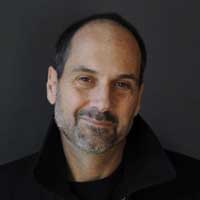 Tony Taddei was born and raised in New Haven, Connecticut. His humor and fiction have appeared in publications including Story Magazine, Folio, New Millennium Writings, The Funny Times, Pif Magazine, Animal and The Florida Review. Tony holds an MFA from the prestigious Bennington Writing Seminars and is a recipient of the New Jersey State Council on the Arts Fellowship for fiction. A trained actor, for many years Tony created characters on stage before turning his attention to inventing life on the page. Tony currently resides in New Jersey where he raised three daughters and lives with his wife Karen and their 2-year-old Cockapoo Brodie.
Tony Taddei was born and raised in New Haven, Connecticut. His humor and fiction have appeared in publications including Story Magazine, Folio, New Millennium Writings, The Funny Times, Pif Magazine, Animal and The Florida Review. Tony holds an MFA from the prestigious Bennington Writing Seminars and is a recipient of the New Jersey State Council on the Arts Fellowship for fiction. A trained actor, for many years Tony created characters on stage before turning his attention to inventing life on the page. Tony currently resides in New Jersey where he raised three daughters and lives with his wife Karen and their 2-year-old Cockapoo Brodie.
 Andrea Caswell is a fiction editor at Cleaver Magazine, where she runs the Short Story Clinic to provide feedback on short fiction (submit here). Her work appears or is forthcoming in Tampa Review, River Teeth, The Normal School, Fifth Wednesday, Columbia Journal, and others. In 2019 her fiction was selected for the Sewanee Writers’ Conference. A native of Los Angeles, she now lives in Newburyport, Massachusetts. For an opportunity to write with Andrea, you can register for her upcoming class, The Write Time, here.
Andrea Caswell is a fiction editor at Cleaver Magazine, where she runs the Short Story Clinic to provide feedback on short fiction (submit here). Her work appears or is forthcoming in Tampa Review, River Teeth, The Normal School, Fifth Wednesday, Columbia Journal, and others. In 2019 her fiction was selected for the Sewanee Writers’ Conference. A native of Los Angeles, she now lives in Newburyport, Massachusetts. For an opportunity to write with Andrea, you can register for her upcoming class, The Write Time, here.

